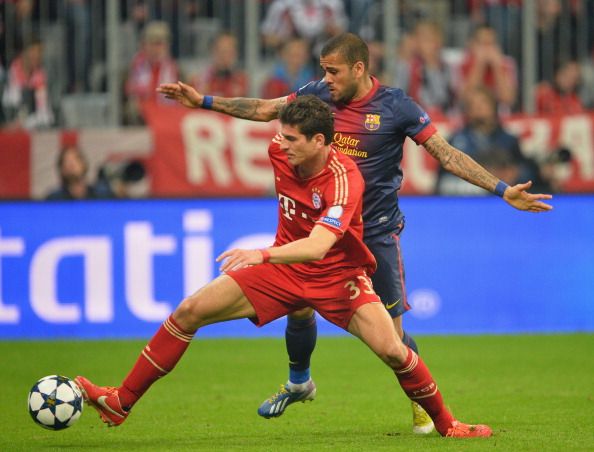
Bayern Munich 4-0 Barcelona: Tactical Analysis
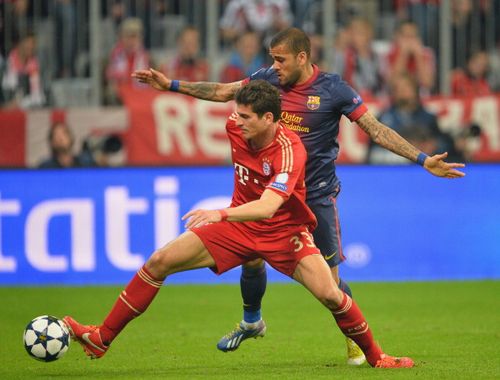
Hours after announcing the unexpected signing of Mario Gotze from rivals Dortmund, Bayern Munich went ahead and shocked the footballing world again. It was uncharted territory for Barcelona. Rarely do opposition so significantly humiliate the Catalan giants. Some may say Barca got lucky in the previous rounds, overturning disappointing results in the 2nd leg. But after Bayern’s 4-0 thrashing at the Allianz Arena, it seems unlikely that Barcelona will get a shot at a 5th Champions League crown.
Bayern Munich have put the disappointment of last season behind them as they displayed a sensational performance in front of their home fans. Incredible organisation, constant pressing, effective counter-attack play and a refreshing change in European football.
Line Ups
The question being asked leading up to the game was whether Ballon d’Or winner, Lionel Messi, would start for the away side. The Argentine did, seemingly despite lacking match fitness. The exclusion of David Villa was brought into question. 22-yr-old Marc Bartra started alongside Pique ahead of Song and Abidal, with Puyol and Mascherano ruled out with injury.
No real surprises for Bayern. Mario Mandzukic was the most notable absentee, with his namesake Gomez took his place. Jerome Boateng was selected to start ahead of Van Buyten, paired with Dante in the heart of Bayern’s midfield. Rumours were that Bayern could go with 3 defensive midfielders, but they stuck to their principle, Muller playing behind the striker and Martinez-Schweingsteiger as usual behind them.
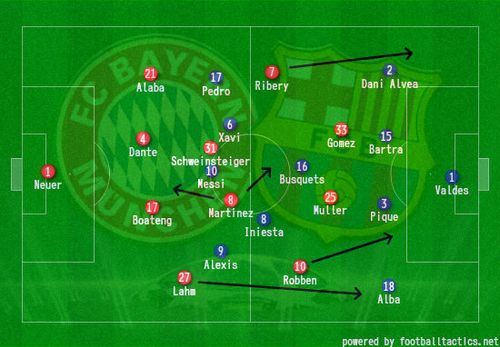
Made using our Tactics Creator App
Analysis
To stop Barcelona, neutralising their attack is vital. And to do that, keeping Lionel Messi out of the game is essential. Bayern Munich were clinical in this regard. Merely man-marking Messi rarely works. The little Argentine loves to have his opponents stick to him, thus allowing him to get past them. What AC Milan did effectively a few weeks back was have multiple men on Messi. Not necessarily man-marking. Man-marking Messi reduces that players involvement in other areas of the pitch. What Milan did (and Bayern last night) was have men closest to Messi close down on him, wherever he moved. A sort of zonal marking with two-three men constantly keeping him out of the game. It resulted in Barca’s false 9 being completely out of the game. His lack of fitness didn’t help either.
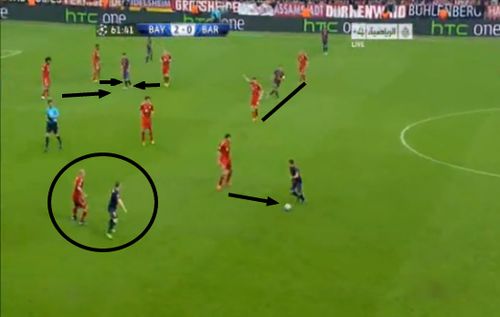
The above picture perfectly sums up Bayern’s system. Men completely on Messi, isolating him from any attack. The player in possession was pressed, his passing options were covered. Xavi was prevented from having any free space irrespective of whether he could directly influence the attack. Bayern Munich had done their homework.
Cutting out supply to Lionel Messi is imperative as well. Xavi remains the main supply source to the front man in Barcelona’s play. They followed a similar strategy with Xavi, albeit not so rigidly. But for much of the game, the battle in Barcelona’s midfield was between Bastian Schweinsteiger and Xavi Hernandez. The German constantly kept on the Spaniard through most of the game, preventing him from having any real impact.
Xavi tried to use this to his advantage, and it worked for some part. Unlike his usual approach where he sits deep, he decided to avoid the nuisance of Schweinsteiger’s constant marking by advancing further forward. Messi already was dropping deeper to occupy a more central midfield role and moving towards the right flank. Xavi occupied that false 9 berth for a small part, pulling Schweinsteiger with him, which left a hole in the centre of Bayern’s midfield. It didn’t prove to be as costly as it should have though, because Bayern has a hard-working side that attack and defend in numbers. The two wingers Ribery & Robben tracked back to cover the flanks, and any gap left by a Bayern player. This also allowed Philip Lahm (who was extremely effective) and David Alaba on either flank to make runs down the channel. It was this overlapping run that even got the 4th goal.
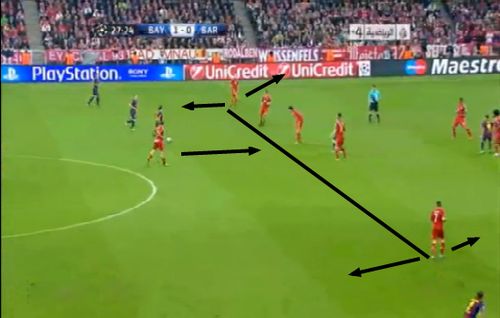
Besides the wingers’ defensive duties, the two central attacking players in Gomez and Muller also dropped to assist the defensive duties of the team. It closed down the playing surface and prevented Barca from stretching the play.
A mention has to be made, to arguably the best player on the pitch, Javi Martinez. The ex-Bilbao man knew the Barca side better than any player and he displayed why he was so highly rated. It’s not just his physicality that is difficult to play against, or his aerial prowess. It’s his workhorse nature and hard-working attitude that make him a dangerous man in defence. He didn’t get involved regularly in possession, but it was his off-the-ball play that made him effective in breaking down Barcelona. He defended across the midfield, pressing Xavi & Iniesta, while also preventing Leo Messi to get into the game. He managed only 18 passes at an 86% completion rate but along with Schweinsteiger, they completed 13 successful tackles. The duo also made 7 interceptions, preventing Barcelona in midfield, their main creative area, and the zone where Messi starts his attack from.
It would be unfair to give full-credit to Bayern’s defensive midfield duo. Their play extends further than that and wouldn’t have been possible without the work of the two wide men on either side, and the two attackers in front of them.
Barcelona usually manage to succeed due to the time allowed to them on the ball, right from defence into midfield. Teams usually only make it tight for them in attacking areas. What Bayern did was collectively press their opponents, right from the defensive third of the pitch. It didn’t allow the Spanish side to formulate any sort of attack. They still managed to play their passes and enjoyed 66% possession, but constant possession and passes did them no good as it didn’t come to any use.
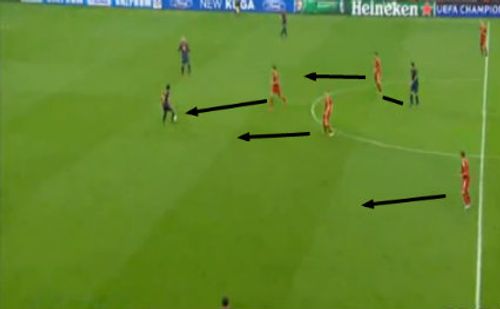
It was their type of pressing that was important. Two men usually ran towards the defence when they had possession, but as they advanced further forward, more men were deployed against the man in possession. They crowded out the player in possession, pressuring him to concede the ball.
Bayern are regularly complemented for their quick counter-attacking football. It was no different against Barcelona. They defended in numbers but immediately got back forward to attack. It was particularly helped by the fact that Barcelona maintain a high-line in defence, allowing their defenders to move into midfield areas. They stuck to their principles at the Allianz Arena as well, failing to adapt their approach based on the opposition. It could be seen for the 3rd goal, Pique ventured forward to support the attack & salvage an away goal. It left a gap at the back and when Bayern got possession at the edge of their own box, the defender was slow to get back, allowing Bayern & Robben in.
Another weakness of Barcelona that was exposed was their lack of any aerial threat. It allowed Bayern to win the aerial duels, winning 11 out of 14. This also allowed Bayern to be threatening from set-pieces. The first two goals arrived as a result of an aerial duel and was enough to see off the opponents. With the likes of Gomez, Dante & Martinez in the side, Barcelona didn’t stand a chance when the ball left the ground.
The lack of creativity from Barcelona was evident, their midfield was shut out of the game. When the ball was with Barcelona in the centre, two opposing central Bayern players closed the man down. When it moved into the wider areas, one of the dropping wingers or the full-backs came in. There was no avenue to create an attack. It required immense organisation & discipline. An extremely professional approach and enough to win you the European Cup.
It took 68 minutes for Barcelona to get an effort on goal, a tame effort from Bartra. That was in fact Barcelona’s only shot on goal the entire game. 3 other shots proved to be ineffective. It shows you how poor Barcelona were in attack (or how strong Bayern were in defence) that a defender, Marc Bartra, took the most shots on goal for their side. A squandered opportunity from close range and that effort on goal. A 90% pass completion was all Barcelona could boast, along with their superior possession, but that doesn’t win you football matches.
Bayern too rely on their midfield, like Barcelona. But unlike their opponents, the German club’s midfield is quicker to create attacks rather than recycling balls in the midfield area. They were present to quickly distribute play from a defensive zone, immediately to the attacking third to foster quick counter attacks. 15 shots, almost half on target, despite only 34% possession is a representation of the above approach. They were more decisive in possession and a clear idea of what to do with the ball.
Conclusion
A 4 goal deficit is too much to ask for even Barcelona. The Nou Camp brings out a different Barcelona, but with the class in Bayern’s side, it is unlikely that they’ll prevent the Bundesliga champions from a 2ndsuccessive Champions League final appearance. The final score of Bayern Munich 4-0 Barcelona may have surprised many, but it showed Barcelona’s weakness in defence, aerial situations and lack of a Plan B.
For Bayern, this may be just the start of things to come. The league title is in the bag, a treble is quite possible, and there is the small matter of the arrival of a certain Pep Guardiola in the summer.